 A Coaching Power Tool Created by Helena Torres
A Coaching Power Tool Created by Helena Torres
(Life Coach, PORTUGAL)
Success
The victory of success is half won when one gains the habit of setting and achieving goals. OgMandino
There are more than 50.000 results for books with a title containing the word “success” in Amazon.com[1]. We live in a society where success and goals surround us daily, from the moment we join the school, throughout our work life.
Regardless of what we define as a personal success, the social script has somehow limited the concept of success to achieving the positive desired outcome, to accomplishing an aim or purpose.
The issue with a perspective based on success is that you either achieved, or you didn´t. If you achieved your goal, you were successful; all is well.
However, we don´t always get what we want or what we aim for. What happens if you fail to achieve it?
If you are a college student, your goal is to pass the year. You study all year diligently and you get good grades. The final national exams come, you are stressed, you fail one exam. You have to stay behind one year and repeat it.
If you work in a company, your goal is to achieve your KPIs[2]. If your KPI is to bring five new contracts per quarter, and you get only 4, you miss the entire quarterly bónus.
If you wish to lose 10Kg in one year, you sign up for the gym and a diet. You change your lifestyle, your shopping habits, your eating habits. You learn to cook healthy food. Yet, by the year´s end, you either lost them or not.
The problem of a success perspective is that we enter in a mindset of measuring our lives and our self-worth based on our successes history. Moreover, we join in a logic of “either-or”: you either pass the national exams and graduate or not; you either get the quarterly bonus or not, you either lost 10Kg or not.
There is no middle ground when you measure success.
Furthermore, the notion of success is significantly linked with progress, which is, according to the Cambridge dictionary, “to move to an improved or more developed state, or a forward position”[3].
Thus, in our minds, we have an idea that the usual process is to progress towards our goals consistently: you keep learning more and more, you keep bringing more and more contracts, you keep losing extra weight, consistently over time. We tend to believe that with enough self-discipline and willpower, we will ensure the desired outputs at a steady growth, forward progress, consistent way.
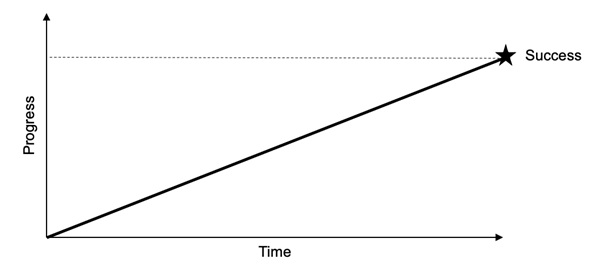 Figure 1 – We tend to believe that progress is linear, provided that our efforts are constant
Figure 1 – We tend to believe that progress is linear, provided that our efforts are constant
If you are a perfectionist, then the chances are that you set for yourself goals that are above your current skills level, or even unrealistic. You want to graduate top of the school, you want to bring six contracts per quarter, and you wish to lose 10Kg in one month.
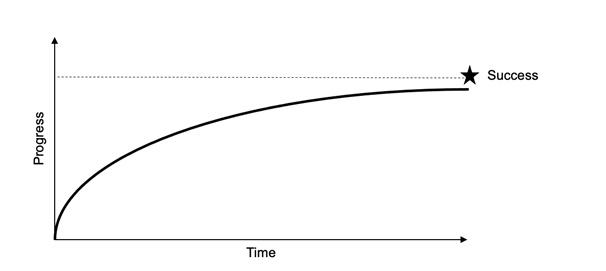 Figure 2 – Perfectionists tend to put enormous efforts in the beginning. They also tend to set more unrealistic and unattainable goals
Figure 2 – Perfectionists tend to put enormous efforts in the beginning. They also tend to set more unrealistic and unattainable goals
Life doesn´t work that way. You can be an A-student and get a B on a test. You can bring four contracts in the first month and none in the last two months of the quarter. You can lose 2Kg in your first month, keep on the same weight for two months, gain one extra kilogram in your 4th month of diet and steadily lose 1kg per month onwards.
Furthermore, goals create an “either-or” conflict: either you achieve your goal and are successful or you fail and you are a disappointment. You mentally box yourself into a narrow version of happiness. This is misguided. It is unlikely that your actual path through life will match the exact journey you had in mind when you set out. It makes no sense to restrict your satisfaction to one scenario when there are many paths to success. James Clear, in Atomic Habits
Reality is much more complex, a bumpy road with highs and lows, plateaus and peaks.
For example, if you want to run the marathon and you are preparing for it in the gym, you might experience weeks in a row where you consistently, daily, run 100 more meters, followed by a week where you are struggling to keep your last mark.
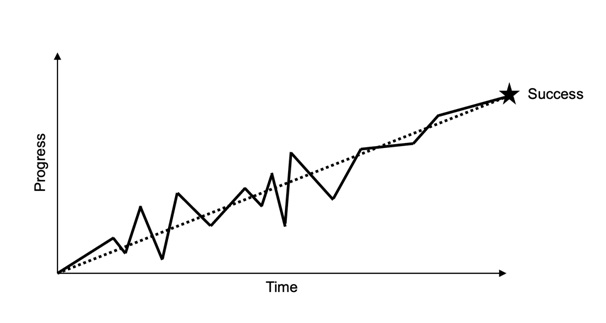 Figure 3 – Most of the time, progress is not linear. There can be moments of great progress, followed by setbacks, or plateaus of no change.
Figure 3 – Most of the time, progress is not linear. There can be moments of great progress, followed by setbacks, or plateaus of no change.
In short, when you look at your goals from a successful or unsuccessful perspective:
Process
Success is a mindset, not a specific achievement. When you are focused on a particular goal, referred to as success, there is a jubilant moment when you achieve it. Afterward, a new goal is established, and you are back to fighting. Thus, success is not to swim against the tide, which leads only to stress, frustration, and low self-esteem. To have abundant success is to flow with life, to cease the tides, and enjoy the ride. True success is to feel satisfaction and realization. Diana Cooper, in A Little Light on the Spiritual Laws
No one starts walking without falling. Yet, eventually, sooner or later, we learn how to run. Looking at a situation from a perspective that everything is a process, where sometimes we face lows, helps you acknowledge the progress and be self-compassionate.
When you become aware of the process, you realize that some days your brain learns better than other days. Some subjects you seem to understand better innately.
You realize that those four contracts helped you build a sustainable portfolio and increase your negotiation skills.
You realize that the weight you lost is lost. The weight you might have gained is new. Perhaps you gained muscle, which is heavier and will help you burn the extra fat you wish to. You wonder if maybe now your body needs a different diet, an additional shock to burn more calories.
Furthermore, you gain respect for your process, for what you have learned, for the changes you already succeed in making, like going to the gym, for example. With this perspective, you understand that it is natural to experience highs and lows. When facing a low, you regard it as part of the process, instead of a prediction or sentence of failure.
A process is a “naturally occurring or designed sequence of changes of properties or attributes” that “results in a transformation”, “a change from one state to another”[4].
A failed year can be an excellent opportunity to assess if that is really what you wish to study. Not getting your bonuses might be just the trigger to negotiate different KPIs where you get a percentage for each achievement. Putting up weight instead of losing it, might be a wake-up call from your body telling you to do a different exercise now, or just reduce the salt intake that is making you retain liquids. As figure 4 shows, a low can be just what you need to revaluate your goals and realize that success might not be to repeat your workout routine but to change it.
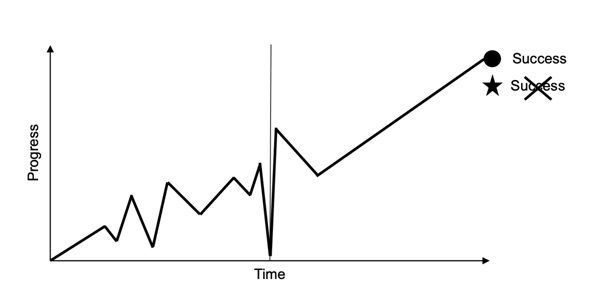 Figure 4 – Some lows might be what we need to take us through the process of analyzing and sometimes changing our goals. Perhaps success is not a star, but a circle.
Figure 4 – Some lows might be what we need to take us through the process of analyzing and sometimes changing our goals. Perhaps success is not a star, but a circle.
“It is a process, not a success”, my friend and confidant used to say to me when I was venting my frustrations with my toxic relationship. I kept pushing, struggling, wishing I had the strength to break up; that was my goal. Yet, to do so, I had to bury my expectations and illusions, raise my self-esteem, populate all the areas of my life so it would not revolve around any relationship. This meant I had to change, to undertake a significant changing process to succeed. As you can imagine, this took time, and sometimes, when I thought I was closer, I would hit a new low. My sister used to tell me “You will break up when your little heart is ready.”. I learned to respect my own time — the time I needed for my process.
In 1969, Elisabeth Kübler-Ross, a swiss psychiatrist, described five common stages of grief based on her work with terminally ill patients. The stages are denial, anger, bargaining, depression, and acceptance.
As Figure 5 shows, it is everything except a linear process. One should not expect to be a bit less angry every day or a bit closer to acceptance every day. In fact, there is not even a specific order for those stages and not everyone experiences all of them. Some people may not experience any of them. These five stages of grief are merely the most commonly observed experienced by the grieving population[5].
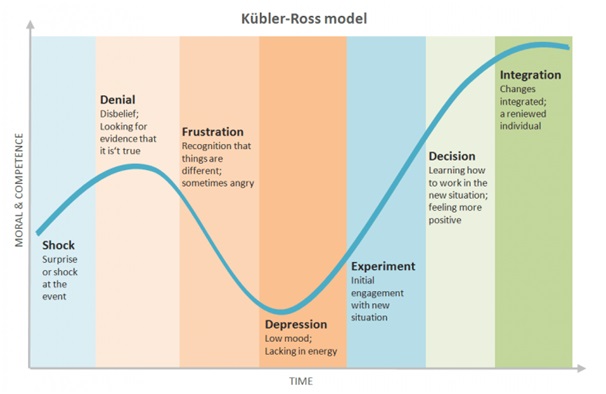 Figure 5 – Kubler-RossGriefCycle[6]
Figure 5 – Kubler-RossGriefCycle[6]
In short, life is about change and change is not linear. It takes time to assimilate it, to integrate it in all our cells, in such a deep level that changes all our thoughts about the matter.
Sometimes, experiencing a low valley is just as much part of the road, as going through the mountains. Sometimes, it is not even possible to reach the high mountains before passing through low valleys. Thus, lows can be part of the process, and though it might look like you are not making any progress, you might be exactly doing the major shift that will allow you to be truly successful in the end.
Success vs.Process
Thus, to me, there are two types of people: those who seek to achieve goals, and those who celebrate. The first is insane. Bit by bit, they progress and create their own insanity. And so insanity has its own timing. Bit by bit, they dig themselves more into it and then become completely lost. The other type of people does not seek to achieve goals. They do not enter into quests of any kind; they are those who celebrate. Osho
Self-Application
Positive and Realistic Thinking
It is hard to change perspectives. That is why it is important to check if how we perceive a situation is based on a fact or a biased idea. Doing some reality checks and choosing a different perspective takes effort and repetition. The more you do it, the more natural it would come to you.
Examples of sentences:
Positive and Realistic Goal Setting
Peg your success on the process. Instead of goals focused on the outcome, set goals focused on the process. For example, if you aim to read more, set a goal for reading 20 minutes each day, instead of a goal about reading 20 pages per day.
Shifting perspectives
Think about a situation where you didn´t achieve your goal.
Overcoming giving up
Giving up comes in place when you believe you can´t achieve your goal or that failing to sustain constant progress is a prediction of failing to achieve the goal.
Realize that repetition is more important than perfection: it is more important to keep doing it than to do it perfectly. You only master the process when you show up over and over again, failure after failure. And you only truly fail when you give up. As long as you remain showing up and flowing with the process, you are always winning.
The most practical way to change who you are to change what you do. Each time you write a page, you are a writer. James Clear
[2]KeyPerfomanceIndicators, a metric of individual performance and success
[3]https://dictionary.cambridge.org/dictionary/english/progress
[4]https://www.biologyonline.com/dictionary/process
[5]https://www.psycom.net/depression.central.grief.html
[6]Image source